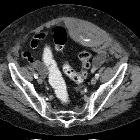spontane retroperitoneale Einblutung

Spontaneous
retroperitoneal hemorrhage • Ruptured abdominal aortic aneurysm - Ganzer Fall bei Radiopaedia

Retroperitoneal
hemorrhage caused by enoxaparin-induced spontaneous lumbar artery bleeding and treated by transcatheter arterial embolization: a case report. CT scan demonstrates left retroperitoneal hematoma with contrast medium extravasation.

Retroperitoneal
hemorrhage caused by enoxaparin-induced spontaneous lumbar artery bleeding and treated by transcatheter arterial embolization: a case report. Selective arteriogram shows contrast medium extravasation from left lumbar artery.
Spontaneous retroperitoneal hemorrhage (SRH) is a distinctive clinical pathology of retroperitoneal bleeding without a preceding history of trauma.
For a broader discussion, including other etiologies, please refer to the parental article on retroperitoneal hemorrhage.
Clinical presentation
Clinical presentation may be vague and varied:
- no inciting history
- no evidence of cutaneous bruising
- back, lower abdominal or groin pain
- hemodynamic instability
- fall in hemoglobin
Pathology
The pathophysiology and pathogenesis of spontaneous retroperitoneal bleeding are unclear. Many hypotheses have been put forth:
- diffuse vasculopathy and arteriosclerosis of small retroperitoneal vessels renders them friable and prone to rupture
- anticoagulation induced immune microangiopathy may cause an unrecognised minor trauma in the microcirculation to cause a hemorrhage
Etiology
Spontaneous retroperitoneal hemorrhage is uncommon and is almost exclusively seen in association with:
- rupture of aortic or visceral artery aneurysm
- rupture of a pathological lesion in a retroperitoneal organ (renal and adrenal)
- anticoagulation states
- coagulopathies
- factor IX deficiency
- factor X deficiency
- von Willebrand disease
- antiphospholipid syndrome
- haemodialysis
Treatment and prognosis
Based on the clinical scenario and cause, the management can be endovascular repair or open surgery.
Siehe auch:
- Wunderlich-Syndrom
- retroperitoneales Hämatom
- spontane Einblutung
- Hämatom im Musculus psoas
- traumatische Retroperitonealblutung
- spontane Ruptur der Vena ovarica
- spontane Ruptur der Vena iliaca
- Ruptur eines Angiomyolipoms der Niere
- Embolisation von Lumbalarterien
und weiter:

 Assoziationen und Differentialdiagnosen zu spontane retroperitoneale Einblutung:
Assoziationen und Differentialdiagnosen zu spontane retroperitoneale Einblutung:






